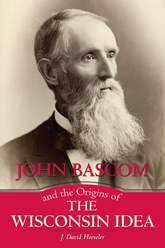|
John Bascom and the Origins of the Wisconsin Idea
J. David Hoeveler
An intellectual history of the public service mission of universities
In the Progressive Era of American history, the state of Wisconsin gained national attention for its innovative economic and political reforms. Amidst this ferment, the “Wisconsin Idea” was popularized—the idea that a public university should improve the lives of people beyond the borders of its campus. Governor Robert La Follette routinely consulted with University of Wisconsin researchers to devise groundbreaking programs and legislation. Although the Wisconsin Idea is often attributed to a 1904 speech by Charles Van Hise, president of the University of Wisconsin, David Hoeveler argues that it originated decades earlier, in the creative and fertile mind of John Bascom.
A philosopher, theologian, and sociologist, Bascom deeply influenced a generation of students at the University of Wisconsin, including La Follette and Van Hise. Hoeveler documents how Bascom drew concepts from German idealism, liberal Protestantism, and evolutionary theory, transforming them into advocacy for social and political reform. He was a champion of temperance, women’s rights, and labor, all of which brought him controversy as president of the university from 1874 to 1887. In a way unmatched by any leader of a major American university in his time, Bascom outlined a social gospel that called for an expanded role for state governments and universities as agencies of moral improvement.
Hoeveler traces the intellectual history of the Wisconsin Idea from the nineteenth century to such influential Progressive Era thinkers as Richard T. Ely and John R. Commons, who believed university researchers should be a vital source of expertise for government and citizens.
 J. David Hoeveler holds a Distinguished Professorship in History at the University of Wisconsin–Milwaukee. He is the author of seven books, including Creating the American Mind, The Evolutionists, and Watch on the Right.
J. David Hoeveler holds a Distinguished Professorship in History at the University of Wisconsin–Milwaukee. He is the author of seven books, including Creating the American Mind, The Evolutionists, and Watch on the Right.
Praise
“Comprehensive and insightful. Hoeveler shows that John Bascom played a pivotal role in the foundation of the American public university as a radically new institution of higher learning, dedicated to producing better citizens and serving as a resource for government of the commonwealth.”
—John D. Buenker, author of The Progressive Era, 1893–1914
“Identifies the philosopher, theologian, and sociologist [John Bascom] as the originator of the notion of the 'Wisconsin Idea,' or the idea that public universities should benefit people beyond the borders of a campus.”
—Chronicle of Higher Education
“A satisfying biography for anyone interested in progressive politics, nineteenth-century intellectual thought, or university history.”
—Michigan Historical Review
“As we face contemporary privatization trends that undermine higher education as a public good, the book serves as a reminder of the powerful ideas that nurtured the land-grant college promises of democratic service and state engagement. Hoeveler has a magisterial command of intellectual movements that resist generalization and that demand readers wrestle with nuance and complexity.”
—History of Education Quarterly
Additional Resources
Listen to J. David Hoeveler speaking about this book:
Wisconsin Public Radio interview http://www.wpr.org/listen/1021751
Of Related Interest
|

9XM Talking
WHA Radio and the Wisconsin Idea
Randall Davidson |

Cold War University
Madison and the New Left in the Sixties
Matthew Levin |
|

Larger images
New in Paperback!
September 2017
LC: 2015038423 LA
248 pp. 6x 9
12 b/w illus.
|

